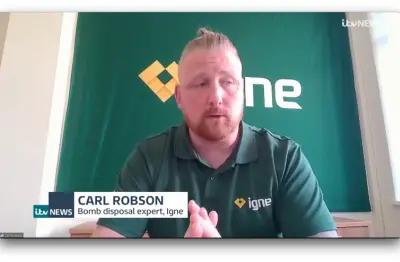Expert Opinion for the BBC
As news coverage of the Plymouth bomb find continues, Igne's Explosive Ordnance Disposal (EOD) and research experts have been cited by the BBC and regional press, and have provided insight into what the Army may do next, and how insurers may involve an 'occasioned by war' clause to avoid paying out for any potential damage.
As news of the bomb find in Plymouth continues to roll, Igne has been cited by the BBC as experts in unexploded ordnance, and referenced in regional press for insights into the challenges facing both the Army and local residents.
The bomb was unearthed by a local homeowner's father as he began digging foundations for an extension. Since then an extensive cordon has been put in place, residents have been evacuated and the Army has been working around the clock to make the device safe.
Igne's Research Manager Emily Damerell explains the history of the area and why it is not surprising this unexploded bomb has been found:
“During WWII, various records were compiled in Plymouth by Air Raid Precaution wardens, including written reports and bomb census maps. I have included a section of just one of these maps, which shows the area of St Michael Avenue in Keyham where this week’s bomb has been discovered.

“On the map, the red circles mark bombs that exploded, while the blue circles mark bombs handled by the Bomb Disposal Officers during WWII, indicating these did not explode on impact. The mappers also linked the bomb strikes with a red line, indicating potential bomb clusters and the direction of aircraft.
“From this map, we observe a line crossing the vicinity of the unexploded bomb (UXB) found this week, with known unexploded bombs scattered across the area. This is just one map of several we have, which show a similar scenario. This map effectively illustrates how this UXB has ended up in a residential garden, unnoticed by both residents until now - and the bomb disposal officers back in the day who, by the looks of it, were too overwhelmed with so many incidents to handle.
“It highlights that even in densely populated, developed areas, UXBs from WWII can still lie beneath our homes.”
Meanwhile, one of Igne's leading Explosive Ordnance Disposal experts provided this insight:
“Speaking to my EOD colleagues including some who are still in the Army, those on site are preparing to demolish in-situ. It’s possible they will be considering a low order technique – but one only has to remember what happened in Great Yarmouth recently when low order was imposed but it became high order and the impact was significant. They will have this in mind and be pre-empting similar which is why they have extended the cordon.
“Looking at the one image I have available, it appears to be air-dropped ordnance, clearly in an unstable state as it is heavily corroded. You can see it is lying just beneath made ground. The experts on site will be concerned about the stability of the device as well as the secondary issue of damaging utilities and properties in the area.
“If, as many suspect, it is too unstable to move, there will be no choice but to demolish in-situ. This will be of huge concern to residents because even if well contained, the blast could cause damage to properties, as seen in Exeter – and as we learned from Exeter, insurance companies can invoke an ‘occasioned by war’ clause and avoid having to pay out.
“I so sincerely hope the device is stable enough to be moved away from the area and demolished safely away from people and properties. However, any device located in an urban setting has to be treated with kid gloves, and this is why the cordon has been extended, families have been evacuated and the Army are taking the time they need to plan for the worst case scenario to mitigate threat to life first and foremost.”
As authorities in unexploded ordnance threat mitigation, Igne has subject matter experts available for comment. Contact us for rapid and insightful commentary.
Other articles of interest

How Igne’s UXO risk assessments keep clients on time and budget
Igne’s research team create detailed UXO risk assessments so clients can determine the risk level of their sites.

Expert Opinion for ITV News
In a report about unexploded ordnance being discovered on a beach in Hornsea, following coastal erosion, Igne's bomb disposal expert and UXO Project Manager Carl Robson featured on ITV news with advice to the public about encountering suspicious devices.


